Ethical Leadership and Effectiveness
VerifiedAdded on 2020/05/11
|8
|3289
|421
AI Summary
This assignment focuses on the topic of ethical leadership and its influence on various aspects of an organization. It examines research articles that explore the relationship between ethical leadership, leader effectiveness, organizational commitment, absenteeism, willingness to report ethical problems, job search behaviors during organizational change, and innovative work behavior. Students are expected to analyze these studies and understand how ethical leadership practices can positively impact organizational outcomes.
Contribute Materials
Your contribution can guide someone’s learning journey. Share your
documents today.
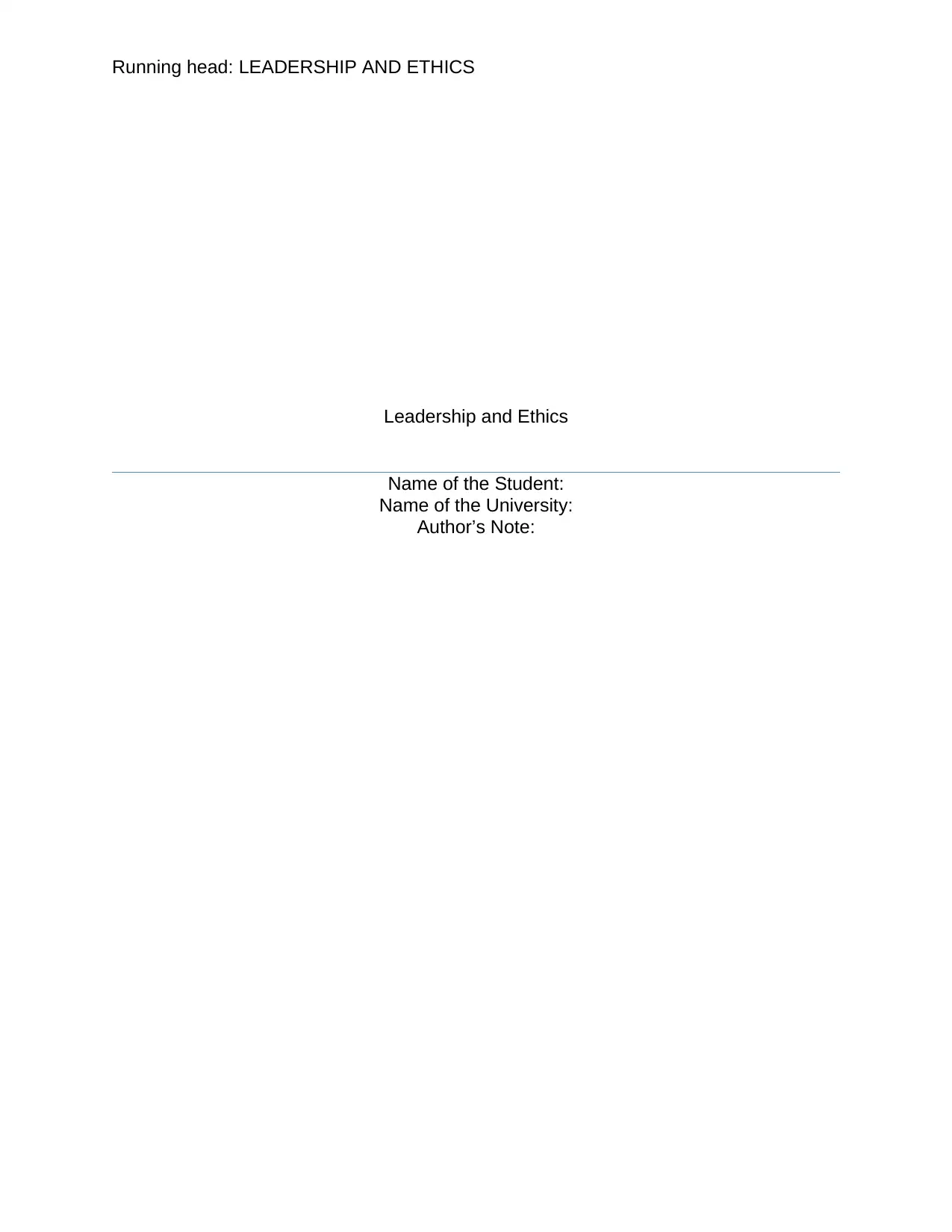
Running head: LEADERSHIP AND ETHICS
Leadership and Ethics
Name of the Student:
Name of the University:
Author’s Note:
Leadership and Ethics
Name of the Student:
Name of the University:
Author’s Note:
Secure Best Marks with AI Grader
Need help grading? Try our AI Grader for instant feedback on your assignments.
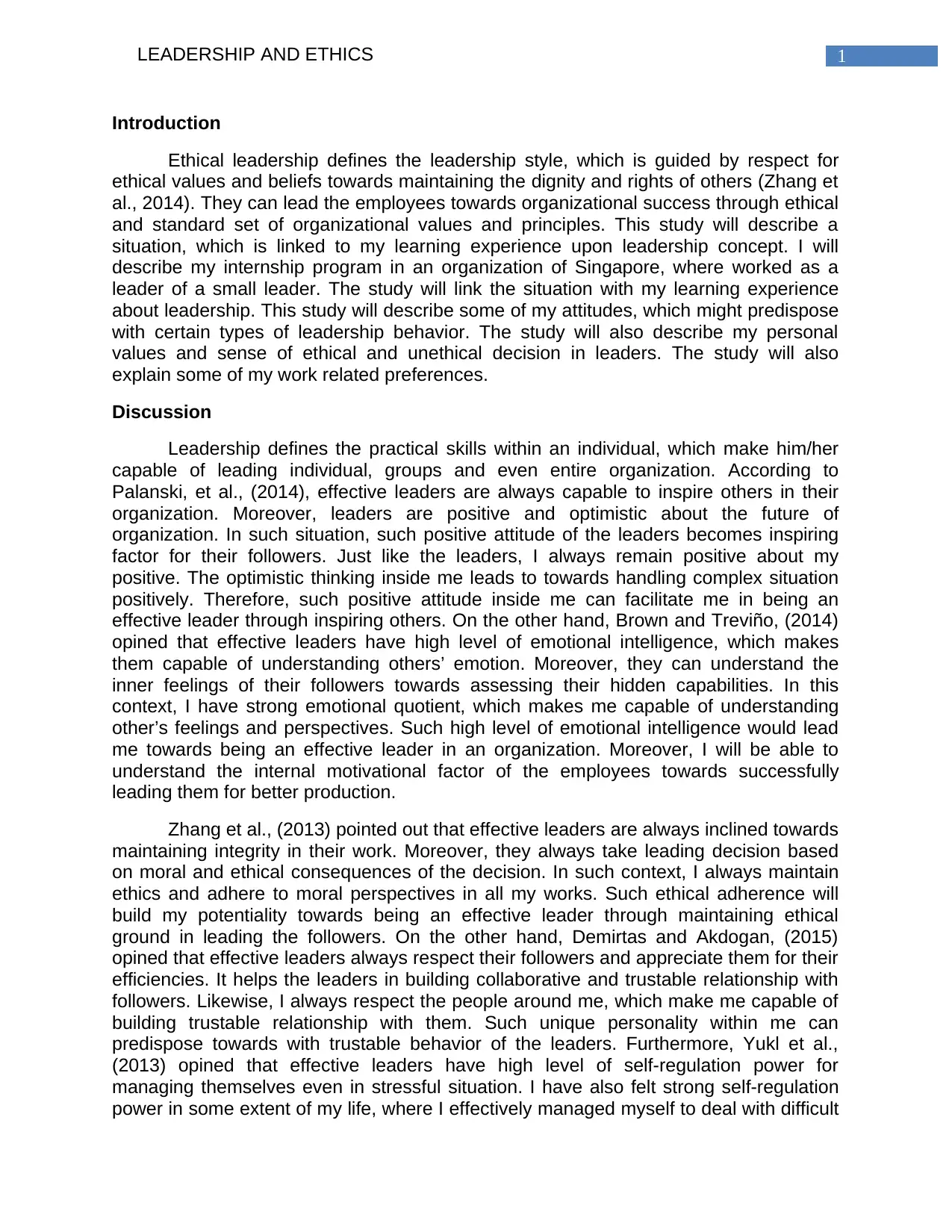
1LEADERSHIP AND ETHICS
Introduction
Ethical leadership defines the leadership style, which is guided by respect for
ethical values and beliefs towards maintaining the dignity and rights of others (Zhang et
al., 2014). They can lead the employees towards organizational success through ethical
and standard set of organizational values and principles. This study will describe a
situation, which is linked to my learning experience upon leadership concept. I will
describe my internship program in an organization of Singapore, where worked as a
leader of a small leader. The study will link the situation with my learning experience
about leadership. This study will describe some of my attitudes, which might predispose
with certain types of leadership behavior. The study will also describe my personal
values and sense of ethical and unethical decision in leaders. The study will also
explain some of my work related preferences.
Discussion
Leadership defines the practical skills within an individual, which make him/her
capable of leading individual, groups and even entire organization. According to
Palanski, et al., (2014), effective leaders are always capable to inspire others in their
organization. Moreover, leaders are positive and optimistic about the future of
organization. In such situation, such positive attitude of the leaders becomes inspiring
factor for their followers. Just like the leaders, I always remain positive about my
positive. The optimistic thinking inside me leads to towards handling complex situation
positively. Therefore, such positive attitude inside me can facilitate me in being an
effective leader through inspiring others. On the other hand, Brown and Treviño, (2014)
opined that effective leaders have high level of emotional intelligence, which makes
them capable of understanding others’ emotion. Moreover, they can understand the
inner feelings of their followers towards assessing their hidden capabilities. In this
context, I have strong emotional quotient, which makes me capable of understanding
other’s feelings and perspectives. Such high level of emotional intelligence would lead
me towards being an effective leader in an organization. Moreover, I will be able to
understand the internal motivational factor of the employees towards successfully
leading them for better production.
Zhang et al., (2013) pointed out that effective leaders are always inclined towards
maintaining integrity in their work. Moreover, they always take leading decision based
on moral and ethical consequences of the decision. In such context, I always maintain
ethics and adhere to moral perspectives in all my works. Such ethical adherence will
build my potentiality towards being an effective leader through maintaining ethical
ground in leading the followers. On the other hand, Demirtas and Akdogan, (2015)
opined that effective leaders always respect their followers and appreciate them for their
efficiencies. It helps the leaders in building collaborative and trustable relationship with
followers. Likewise, I always respect the people around me, which make me capable of
building trustable relationship with them. Such unique personality within me can
predispose towards with trustable behavior of the leaders. Furthermore, Yukl et al.,
(2013) opined that effective leaders have high level of self-regulation power for
managing themselves even in stressful situation. I have also felt strong self-regulation
power in some extent of my life, where I effectively managed myself to deal with difficult
Introduction
Ethical leadership defines the leadership style, which is guided by respect for
ethical values and beliefs towards maintaining the dignity and rights of others (Zhang et
al., 2014). They can lead the employees towards organizational success through ethical
and standard set of organizational values and principles. This study will describe a
situation, which is linked to my learning experience upon leadership concept. I will
describe my internship program in an organization of Singapore, where worked as a
leader of a small leader. The study will link the situation with my learning experience
about leadership. This study will describe some of my attitudes, which might predispose
with certain types of leadership behavior. The study will also describe my personal
values and sense of ethical and unethical decision in leaders. The study will also
explain some of my work related preferences.
Discussion
Leadership defines the practical skills within an individual, which make him/her
capable of leading individual, groups and even entire organization. According to
Palanski, et al., (2014), effective leaders are always capable to inspire others in their
organization. Moreover, leaders are positive and optimistic about the future of
organization. In such situation, such positive attitude of the leaders becomes inspiring
factor for their followers. Just like the leaders, I always remain positive about my
positive. The optimistic thinking inside me leads to towards handling complex situation
positively. Therefore, such positive attitude inside me can facilitate me in being an
effective leader through inspiring others. On the other hand, Brown and Treviño, (2014)
opined that effective leaders have high level of emotional intelligence, which makes
them capable of understanding others’ emotion. Moreover, they can understand the
inner feelings of their followers towards assessing their hidden capabilities. In this
context, I have strong emotional quotient, which makes me capable of understanding
other’s feelings and perspectives. Such high level of emotional intelligence would lead
me towards being an effective leader in an organization. Moreover, I will be able to
understand the internal motivational factor of the employees towards successfully
leading them for better production.
Zhang et al., (2013) pointed out that effective leaders are always inclined towards
maintaining integrity in their work. Moreover, they always take leading decision based
on moral and ethical consequences of the decision. In such context, I always maintain
ethics and adhere to moral perspectives in all my works. Such ethical adherence will
build my potentiality towards being an effective leader through maintaining ethical
ground in leading the followers. On the other hand, Demirtas and Akdogan, (2015)
opined that effective leaders always respect their followers and appreciate them for their
efficiencies. It helps the leaders in building collaborative and trustable relationship with
followers. Likewise, I always respect the people around me, which make me capable of
building trustable relationship with them. Such unique personality within me can
predispose towards with trustable behavior of the leaders. Furthermore, Yukl et al.,
(2013) opined that effective leaders have high level of self-regulation power for
managing themselves even in stressful situation. I have also felt strong self-regulation
power in some extent of my life, where I effectively managed myself to deal with difficult
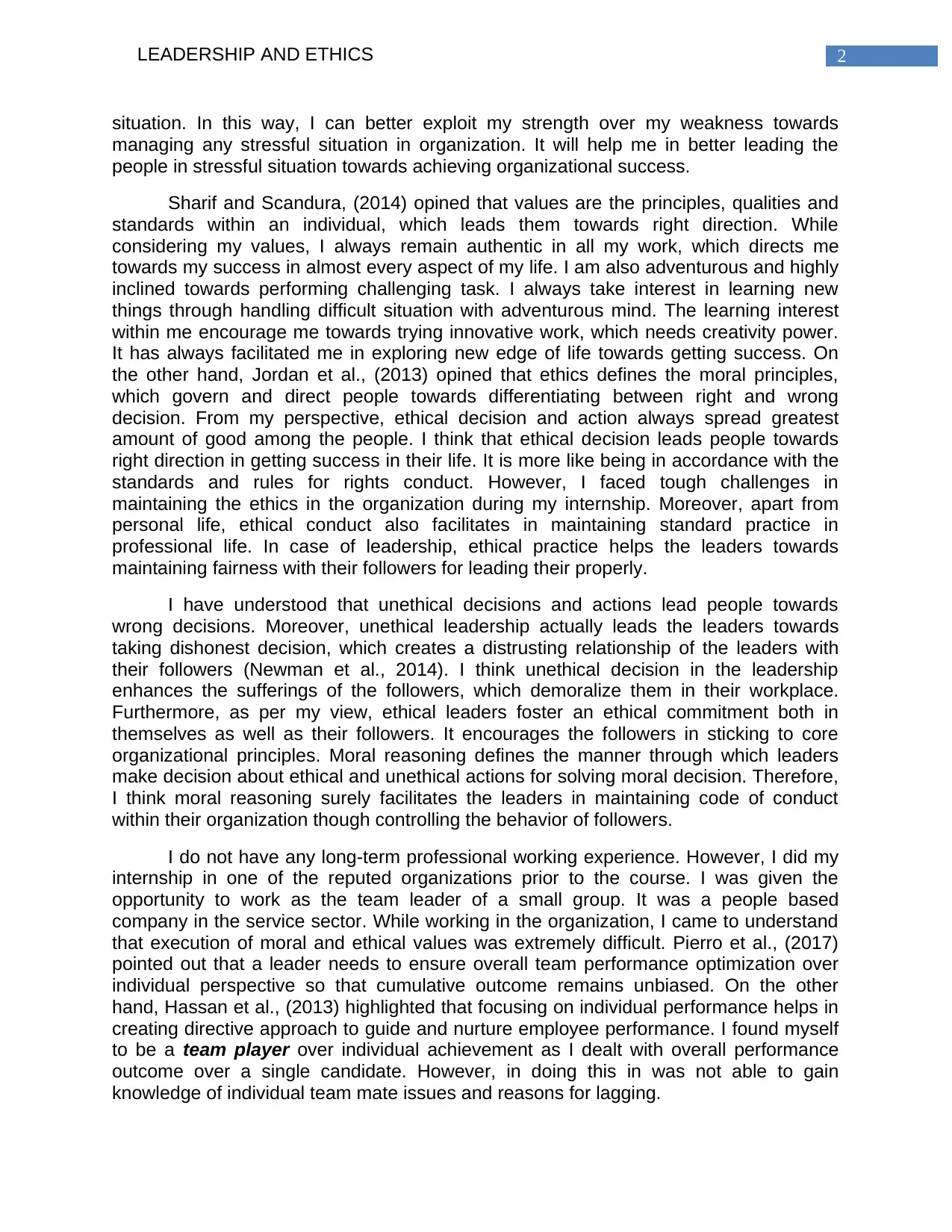
2LEADERSHIP AND ETHICS
situation. In this way, I can better exploit my strength over my weakness towards
managing any stressful situation in organization. It will help me in better leading the
people in stressful situation towards achieving organizational success.
Sharif and Scandura, (2014) opined that values are the principles, qualities and
standards within an individual, which leads them towards right direction. While
considering my values, I always remain authentic in all my work, which directs me
towards my success in almost every aspect of my life. I am also adventurous and highly
inclined towards performing challenging task. I always take interest in learning new
things through handling difficult situation with adventurous mind. The learning interest
within me encourage me towards trying innovative work, which needs creativity power.
It has always facilitated me in exploring new edge of life towards getting success. On
the other hand, Jordan et al., (2013) opined that ethics defines the moral principles,
which govern and direct people towards differentiating between right and wrong
decision. From my perspective, ethical decision and action always spread greatest
amount of good among the people. I think that ethical decision leads people towards
right direction in getting success in their life. It is more like being in accordance with the
standards and rules for rights conduct. However, I faced tough challenges in
maintaining the ethics in the organization during my internship. Moreover, apart from
personal life, ethical conduct also facilitates in maintaining standard practice in
professional life. In case of leadership, ethical practice helps the leaders towards
maintaining fairness with their followers for leading their properly.
I have understood that unethical decisions and actions lead people towards
wrong decisions. Moreover, unethical leadership actually leads the leaders towards
taking dishonest decision, which creates a distrusting relationship of the leaders with
their followers (Newman et al., 2014). I think unethical decision in the leadership
enhances the sufferings of the followers, which demoralize them in their workplace.
Furthermore, as per my view, ethical leaders foster an ethical commitment both in
themselves as well as their followers. It encourages the followers in sticking to core
organizational principles. Moral reasoning defines the manner through which leaders
make decision about ethical and unethical actions for solving moral decision. Therefore,
I think moral reasoning surely facilitates the leaders in maintaining code of conduct
within their organization though controlling the behavior of followers.
I do not have any long-term professional working experience. However, I did my
internship in one of the reputed organizations prior to the course. I was given the
opportunity to work as the team leader of a small group. It was a people based
company in the service sector. While working in the organization, I came to understand
that execution of moral and ethical values was extremely difficult. Pierro et al., (2017)
pointed out that a leader needs to ensure overall team performance optimization over
individual perspective so that cumulative outcome remains unbiased. On the other
hand, Hassan et al., (2013) highlighted that focusing on individual performance helps in
creating directive approach to guide and nurture employee performance. I found myself
to be a team player over individual achievement as I dealt with overall performance
outcome over a single candidate. However, in doing this in was not able to gain
knowledge of individual team mate issues and reasons for lagging.
situation. In this way, I can better exploit my strength over my weakness towards
managing any stressful situation in organization. It will help me in better leading the
people in stressful situation towards achieving organizational success.
Sharif and Scandura, (2014) opined that values are the principles, qualities and
standards within an individual, which leads them towards right direction. While
considering my values, I always remain authentic in all my work, which directs me
towards my success in almost every aspect of my life. I am also adventurous and highly
inclined towards performing challenging task. I always take interest in learning new
things through handling difficult situation with adventurous mind. The learning interest
within me encourage me towards trying innovative work, which needs creativity power.
It has always facilitated me in exploring new edge of life towards getting success. On
the other hand, Jordan et al., (2013) opined that ethics defines the moral principles,
which govern and direct people towards differentiating between right and wrong
decision. From my perspective, ethical decision and action always spread greatest
amount of good among the people. I think that ethical decision leads people towards
right direction in getting success in their life. It is more like being in accordance with the
standards and rules for rights conduct. However, I faced tough challenges in
maintaining the ethics in the organization during my internship. Moreover, apart from
personal life, ethical conduct also facilitates in maintaining standard practice in
professional life. In case of leadership, ethical practice helps the leaders towards
maintaining fairness with their followers for leading their properly.
I have understood that unethical decisions and actions lead people towards
wrong decisions. Moreover, unethical leadership actually leads the leaders towards
taking dishonest decision, which creates a distrusting relationship of the leaders with
their followers (Newman et al., 2014). I think unethical decision in the leadership
enhances the sufferings of the followers, which demoralize them in their workplace.
Furthermore, as per my view, ethical leaders foster an ethical commitment both in
themselves as well as their followers. It encourages the followers in sticking to core
organizational principles. Moral reasoning defines the manner through which leaders
make decision about ethical and unethical actions for solving moral decision. Therefore,
I think moral reasoning surely facilitates the leaders in maintaining code of conduct
within their organization though controlling the behavior of followers.
I do not have any long-term professional working experience. However, I did my
internship in one of the reputed organizations prior to the course. I was given the
opportunity to work as the team leader of a small group. It was a people based
company in the service sector. While working in the organization, I came to understand
that execution of moral and ethical values was extremely difficult. Pierro et al., (2017)
pointed out that a leader needs to ensure overall team performance optimization over
individual perspective so that cumulative outcome remains unbiased. On the other
hand, Hassan et al., (2013) highlighted that focusing on individual performance helps in
creating directive approach to guide and nurture employee performance. I found myself
to be a team player over individual achievement as I dealt with overall performance
outcome over a single candidate. However, in doing this in was not able to gain
knowledge of individual team mate issues and reasons for lagging.
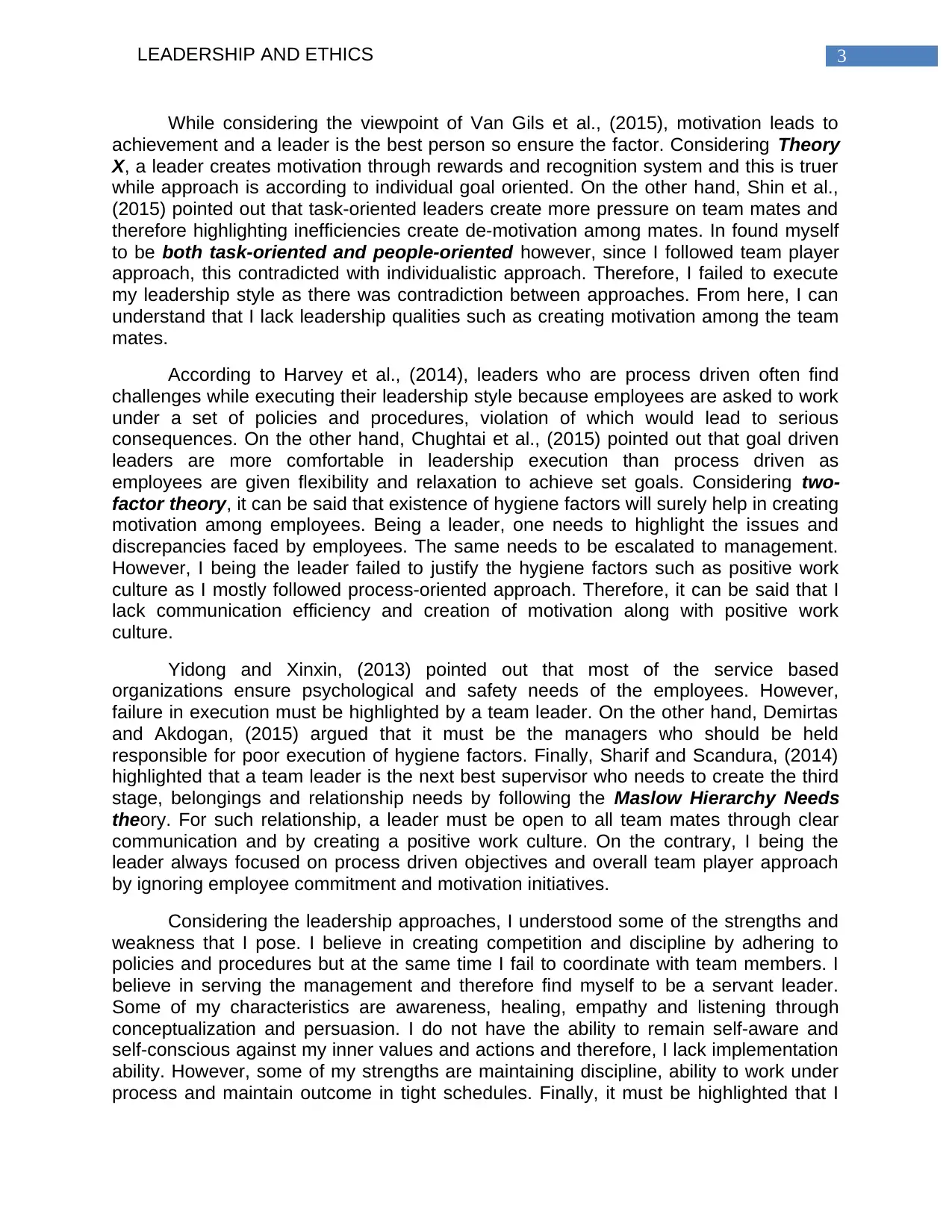
3LEADERSHIP AND ETHICS
While considering the viewpoint of Van Gils et al., (2015), motivation leads to
achievement and a leader is the best person so ensure the factor. Considering Theory
X, a leader creates motivation through rewards and recognition system and this is truer
while approach is according to individual goal oriented. On the other hand, Shin et al.,
(2015) pointed out that task-oriented leaders create more pressure on team mates and
therefore highlighting inefficiencies create de-motivation among mates. In found myself
to be both task-oriented and people-oriented however, since I followed team player
approach, this contradicted with individualistic approach. Therefore, I failed to execute
my leadership style as there was contradiction between approaches. From here, I can
understand that I lack leadership qualities such as creating motivation among the team
mates.
According to Harvey et al., (2014), leaders who are process driven often find
challenges while executing their leadership style because employees are asked to work
under a set of policies and procedures, violation of which would lead to serious
consequences. On the other hand, Chughtai et al., (2015) pointed out that goal driven
leaders are more comfortable in leadership execution than process driven as
employees are given flexibility and relaxation to achieve set goals. Considering two-
factor theory, it can be said that existence of hygiene factors will surely help in creating
motivation among employees. Being a leader, one needs to highlight the issues and
discrepancies faced by employees. The same needs to be escalated to management.
However, I being the leader failed to justify the hygiene factors such as positive work
culture as I mostly followed process-oriented approach. Therefore, it can be said that I
lack communication efficiency and creation of motivation along with positive work
culture.
Yidong and Xinxin, (2013) pointed out that most of the service based
organizations ensure psychological and safety needs of the employees. However,
failure in execution must be highlighted by a team leader. On the other hand, Demirtas
and Akdogan, (2015) argued that it must be the managers who should be held
responsible for poor execution of hygiene factors. Finally, Sharif and Scandura, (2014)
highlighted that a team leader is the next best supervisor who needs to create the third
stage, belongings and relationship needs by following the Maslow Hierarchy Needs
theory. For such relationship, a leader must be open to all team mates through clear
communication and by creating a positive work culture. On the contrary, I being the
leader always focused on process driven objectives and overall team player approach
by ignoring employee commitment and motivation initiatives.
Considering the leadership approaches, I understood some of the strengths and
weakness that I pose. I believe in creating competition and discipline by adhering to
policies and procedures but at the same time I fail to coordinate with team members. I
believe in serving the management and therefore find myself to be a servant leader.
Some of my characteristics are awareness, healing, empathy and listening through
conceptualization and persuasion. I do not have the ability to remain self-aware and
self-conscious against my inner values and actions and therefore, I lack implementation
ability. However, some of my strengths are maintaining discipline, ability to work under
process and maintain outcome in tight schedules. Finally, it must be highlighted that I
While considering the viewpoint of Van Gils et al., (2015), motivation leads to
achievement and a leader is the best person so ensure the factor. Considering Theory
X, a leader creates motivation through rewards and recognition system and this is truer
while approach is according to individual goal oriented. On the other hand, Shin et al.,
(2015) pointed out that task-oriented leaders create more pressure on team mates and
therefore highlighting inefficiencies create de-motivation among mates. In found myself
to be both task-oriented and people-oriented however, since I followed team player
approach, this contradicted with individualistic approach. Therefore, I failed to execute
my leadership style as there was contradiction between approaches. From here, I can
understand that I lack leadership qualities such as creating motivation among the team
mates.
According to Harvey et al., (2014), leaders who are process driven often find
challenges while executing their leadership style because employees are asked to work
under a set of policies and procedures, violation of which would lead to serious
consequences. On the other hand, Chughtai et al., (2015) pointed out that goal driven
leaders are more comfortable in leadership execution than process driven as
employees are given flexibility and relaxation to achieve set goals. Considering two-
factor theory, it can be said that existence of hygiene factors will surely help in creating
motivation among employees. Being a leader, one needs to highlight the issues and
discrepancies faced by employees. The same needs to be escalated to management.
However, I being the leader failed to justify the hygiene factors such as positive work
culture as I mostly followed process-oriented approach. Therefore, it can be said that I
lack communication efficiency and creation of motivation along with positive work
culture.
Yidong and Xinxin, (2013) pointed out that most of the service based
organizations ensure psychological and safety needs of the employees. However,
failure in execution must be highlighted by a team leader. On the other hand, Demirtas
and Akdogan, (2015) argued that it must be the managers who should be held
responsible for poor execution of hygiene factors. Finally, Sharif and Scandura, (2014)
highlighted that a team leader is the next best supervisor who needs to create the third
stage, belongings and relationship needs by following the Maslow Hierarchy Needs
theory. For such relationship, a leader must be open to all team mates through clear
communication and by creating a positive work culture. On the contrary, I being the
leader always focused on process driven objectives and overall team player approach
by ignoring employee commitment and motivation initiatives.
Considering the leadership approaches, I understood some of the strengths and
weakness that I pose. I believe in creating competition and discipline by adhering to
policies and procedures but at the same time I fail to coordinate with team members. I
believe in serving the management and therefore find myself to be a servant leader.
Some of my characteristics are awareness, healing, empathy and listening through
conceptualization and persuasion. I do not have the ability to remain self-aware and
self-conscious against my inner values and actions and therefore, I lack implementation
ability. However, some of my strengths are maintaining discipline, ability to work under
process and maintain outcome in tight schedules. Finally, it must be highlighted that I
Secure Best Marks with AI Grader
Need help grading? Try our AI Grader for instant feedback on your assignments.
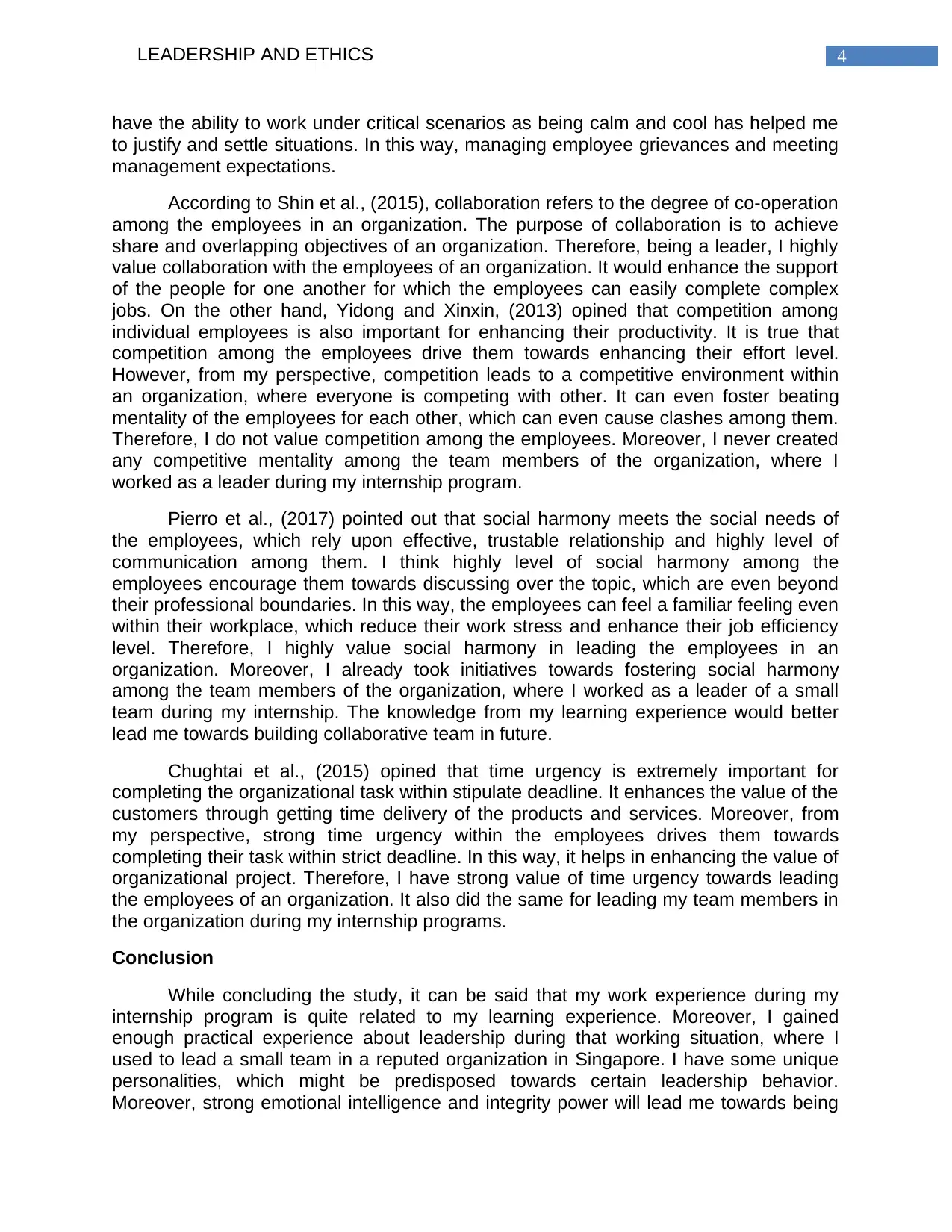
4LEADERSHIP AND ETHICS
have the ability to work under critical scenarios as being calm and cool has helped me
to justify and settle situations. In this way, managing employee grievances and meeting
management expectations.
According to Shin et al., (2015), collaboration refers to the degree of co-operation
among the employees in an organization. The purpose of collaboration is to achieve
share and overlapping objectives of an organization. Therefore, being a leader, I highly
value collaboration with the employees of an organization. It would enhance the support
of the people for one another for which the employees can easily complete complex
jobs. On the other hand, Yidong and Xinxin, (2013) opined that competition among
individual employees is also important for enhancing their productivity. It is true that
competition among the employees drive them towards enhancing their effort level.
However, from my perspective, competition leads to a competitive environment within
an organization, where everyone is competing with other. It can even foster beating
mentality of the employees for each other, which can even cause clashes among them.
Therefore, I do not value competition among the employees. Moreover, I never created
any competitive mentality among the team members of the organization, where I
worked as a leader during my internship program.
Pierro et al., (2017) pointed out that social harmony meets the social needs of
the employees, which rely upon effective, trustable relationship and highly level of
communication among them. I think highly level of social harmony among the
employees encourage them towards discussing over the topic, which are even beyond
their professional boundaries. In this way, the employees can feel a familiar feeling even
within their workplace, which reduce their work stress and enhance their job efficiency
level. Therefore, I highly value social harmony in leading the employees in an
organization. Moreover, I already took initiatives towards fostering social harmony
among the team members of the organization, where I worked as a leader of a small
team during my internship. The knowledge from my learning experience would better
lead me towards building collaborative team in future.
Chughtai et al., (2015) opined that time urgency is extremely important for
completing the organizational task within stipulate deadline. It enhances the value of the
customers through getting time delivery of the products and services. Moreover, from
my perspective, strong time urgency within the employees drives them towards
completing their task within strict deadline. In this way, it helps in enhancing the value of
organizational project. Therefore, I have strong value of time urgency towards leading
the employees of an organization. It also did the same for leading my team members in
the organization during my internship programs.
Conclusion
While concluding the study, it can be said that my work experience during my
internship program is quite related to my learning experience. Moreover, I gained
enough practical experience about leadership during that working situation, where I
used to lead a small team in a reputed organization in Singapore. I have some unique
personalities, which might be predisposed towards certain leadership behavior.
Moreover, strong emotional intelligence and integrity power will lead me towards being
have the ability to work under critical scenarios as being calm and cool has helped me
to justify and settle situations. In this way, managing employee grievances and meeting
management expectations.
According to Shin et al., (2015), collaboration refers to the degree of co-operation
among the employees in an organization. The purpose of collaboration is to achieve
share and overlapping objectives of an organization. Therefore, being a leader, I highly
value collaboration with the employees of an organization. It would enhance the support
of the people for one another for which the employees can easily complete complex
jobs. On the other hand, Yidong and Xinxin, (2013) opined that competition among
individual employees is also important for enhancing their productivity. It is true that
competition among the employees drive them towards enhancing their effort level.
However, from my perspective, competition leads to a competitive environment within
an organization, where everyone is competing with other. It can even foster beating
mentality of the employees for each other, which can even cause clashes among them.
Therefore, I do not value competition among the employees. Moreover, I never created
any competitive mentality among the team members of the organization, where I
worked as a leader during my internship program.
Pierro et al., (2017) pointed out that social harmony meets the social needs of
the employees, which rely upon effective, trustable relationship and highly level of
communication among them. I think highly level of social harmony among the
employees encourage them towards discussing over the topic, which are even beyond
their professional boundaries. In this way, the employees can feel a familiar feeling even
within their workplace, which reduce their work stress and enhance their job efficiency
level. Therefore, I highly value social harmony in leading the employees in an
organization. Moreover, I already took initiatives towards fostering social harmony
among the team members of the organization, where I worked as a leader of a small
team during my internship. The knowledge from my learning experience would better
lead me towards building collaborative team in future.
Chughtai et al., (2015) opined that time urgency is extremely important for
completing the organizational task within stipulate deadline. It enhances the value of the
customers through getting time delivery of the products and services. Moreover, from
my perspective, strong time urgency within the employees drives them towards
completing their task within strict deadline. In this way, it helps in enhancing the value of
organizational project. Therefore, I have strong value of time urgency towards leading
the employees of an organization. It also did the same for leading my team members in
the organization during my internship programs.
Conclusion
While concluding the study, it can be said that my work experience during my
internship program is quite related to my learning experience. Moreover, I gained
enough practical experience about leadership during that working situation, where I
used to lead a small team in a reputed organization in Singapore. I have some unique
personalities, which might be predisposed towards certain leadership behavior.
Moreover, strong emotional intelligence and integrity power will lead me towards being
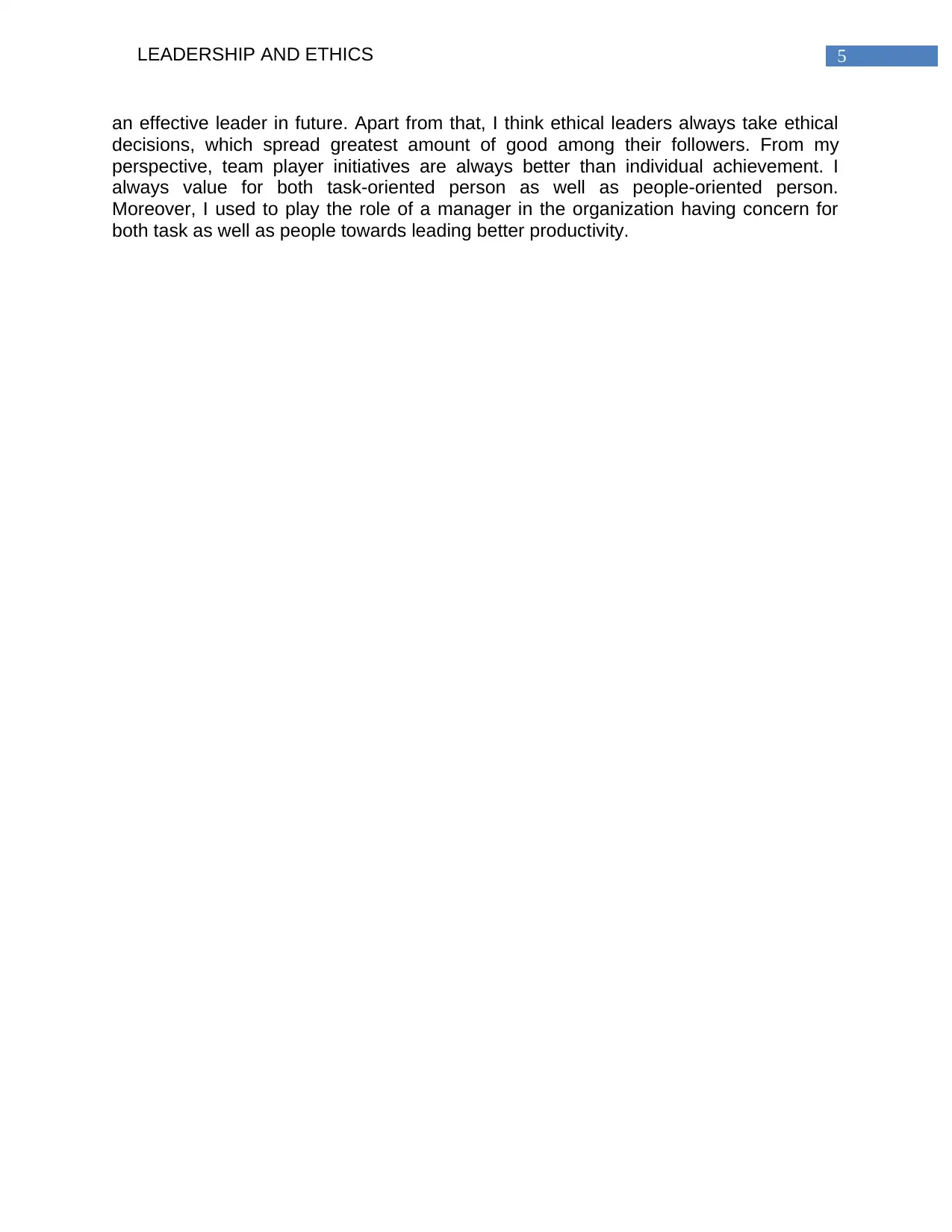
5LEADERSHIP AND ETHICS
an effective leader in future. Apart from that, I think ethical leaders always take ethical
decisions, which spread greatest amount of good among their followers. From my
perspective, team player initiatives are always better than individual achievement. I
always value for both task-oriented person as well as people-oriented person.
Moreover, I used to play the role of a manager in the organization having concern for
both task as well as people towards leading better productivity.
an effective leader in future. Apart from that, I think ethical leaders always take ethical
decisions, which spread greatest amount of good among their followers. From my
perspective, team player initiatives are always better than individual achievement. I
always value for both task-oriented person as well as people-oriented person.
Moreover, I used to play the role of a manager in the organization having concern for
both task as well as people towards leading better productivity.
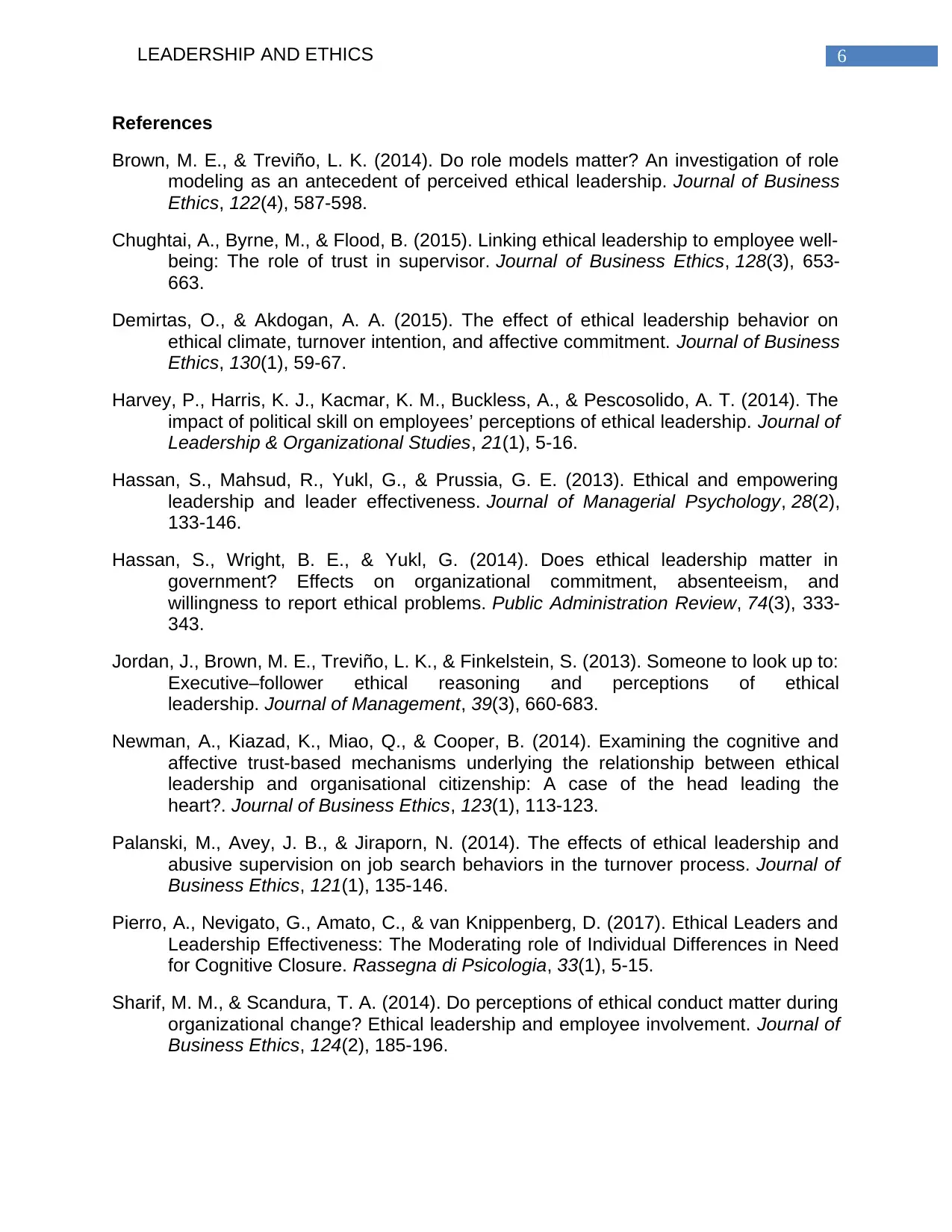
6LEADERSHIP AND ETHICS
References
Brown, M. E., & Treviño, L. K. (2014). Do role models matter? An investigation of role
modeling as an antecedent of perceived ethical leadership. Journal of Business
Ethics, 122(4), 587-598.
Chughtai, A., Byrne, M., & Flood, B. (2015). Linking ethical leadership to employee well-
being: The role of trust in supervisor. Journal of Business Ethics, 128(3), 653-
663.
Demirtas, O., & Akdogan, A. A. (2015). The effect of ethical leadership behavior on
ethical climate, turnover intention, and affective commitment. Journal of Business
Ethics, 130(1), 59-67.
Harvey, P., Harris, K. J., Kacmar, K. M., Buckless, A., & Pescosolido, A. T. (2014). The
impact of political skill on employees’ perceptions of ethical leadership. Journal of
Leadership & Organizational Studies, 21(1), 5-16.
Hassan, S., Mahsud, R., Yukl, G., & Prussia, G. E. (2013). Ethical and empowering
leadership and leader effectiveness. Journal of Managerial Psychology, 28(2),
133-146.
Hassan, S., Wright, B. E., & Yukl, G. (2014). Does ethical leadership matter in
government? Effects on organizational commitment, absenteeism, and
willingness to report ethical problems. Public Administration Review, 74(3), 333-
343.
Jordan, J., Brown, M. E., Treviño, L. K., & Finkelstein, S. (2013). Someone to look up to:
Executive–follower ethical reasoning and perceptions of ethical
leadership. Journal of Management, 39(3), 660-683.
Newman, A., Kiazad, K., Miao, Q., & Cooper, B. (2014). Examining the cognitive and
affective trust-based mechanisms underlying the relationship between ethical
leadership and organisational citizenship: A case of the head leading the
heart?. Journal of Business Ethics, 123(1), 113-123.
Palanski, M., Avey, J. B., & Jiraporn, N. (2014). The effects of ethical leadership and
abusive supervision on job search behaviors in the turnover process. Journal of
Business Ethics, 121(1), 135-146.
Pierro, A., Nevigato, G., Amato, C., & van Knippenberg, D. (2017). Ethical Leaders and
Leadership Effectiveness: The Moderating role of Individual Differences in Need
for Cognitive Closure. Rassegna di Psicologia, 33(1), 5-15.
Sharif, M. M., & Scandura, T. A. (2014). Do perceptions of ethical conduct matter during
organizational change? Ethical leadership and employee involvement. Journal of
Business Ethics, 124(2), 185-196.
References
Brown, M. E., & Treviño, L. K. (2014). Do role models matter? An investigation of role
modeling as an antecedent of perceived ethical leadership. Journal of Business
Ethics, 122(4), 587-598.
Chughtai, A., Byrne, M., & Flood, B. (2015). Linking ethical leadership to employee well-
being: The role of trust in supervisor. Journal of Business Ethics, 128(3), 653-
663.
Demirtas, O., & Akdogan, A. A. (2015). The effect of ethical leadership behavior on
ethical climate, turnover intention, and affective commitment. Journal of Business
Ethics, 130(1), 59-67.
Harvey, P., Harris, K. J., Kacmar, K. M., Buckless, A., & Pescosolido, A. T. (2014). The
impact of political skill on employees’ perceptions of ethical leadership. Journal of
Leadership & Organizational Studies, 21(1), 5-16.
Hassan, S., Mahsud, R., Yukl, G., & Prussia, G. E. (2013). Ethical and empowering
leadership and leader effectiveness. Journal of Managerial Psychology, 28(2),
133-146.
Hassan, S., Wright, B. E., & Yukl, G. (2014). Does ethical leadership matter in
government? Effects on organizational commitment, absenteeism, and
willingness to report ethical problems. Public Administration Review, 74(3), 333-
343.
Jordan, J., Brown, M. E., Treviño, L. K., & Finkelstein, S. (2013). Someone to look up to:
Executive–follower ethical reasoning and perceptions of ethical
leadership. Journal of Management, 39(3), 660-683.
Newman, A., Kiazad, K., Miao, Q., & Cooper, B. (2014). Examining the cognitive and
affective trust-based mechanisms underlying the relationship between ethical
leadership and organisational citizenship: A case of the head leading the
heart?. Journal of Business Ethics, 123(1), 113-123.
Palanski, M., Avey, J. B., & Jiraporn, N. (2014). The effects of ethical leadership and
abusive supervision on job search behaviors in the turnover process. Journal of
Business Ethics, 121(1), 135-146.
Pierro, A., Nevigato, G., Amato, C., & van Knippenberg, D. (2017). Ethical Leaders and
Leadership Effectiveness: The Moderating role of Individual Differences in Need
for Cognitive Closure. Rassegna di Psicologia, 33(1), 5-15.
Sharif, M. M., & Scandura, T. A. (2014). Do perceptions of ethical conduct matter during
organizational change? Ethical leadership and employee involvement. Journal of
Business Ethics, 124(2), 185-196.
Paraphrase This Document
Need a fresh take? Get an instant paraphrase of this document with our AI Paraphraser
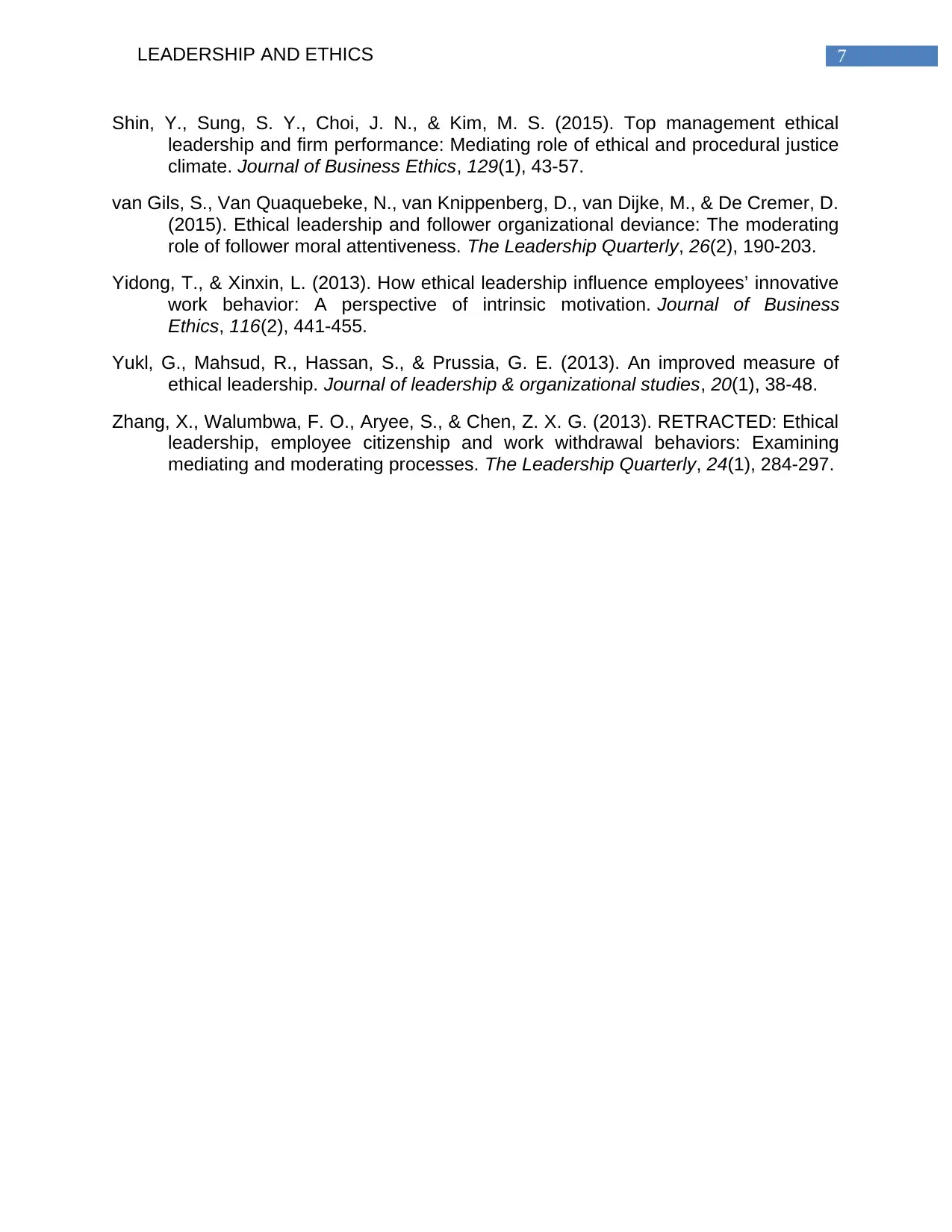
7LEADERSHIP AND ETHICS
Shin, Y., Sung, S. Y., Choi, J. N., & Kim, M. S. (2015). Top management ethical
leadership and firm performance: Mediating role of ethical and procedural justice
climate. Journal of Business Ethics, 129(1), 43-57.
van Gils, S., Van Quaquebeke, N., van Knippenberg, D., van Dijke, M., & De Cremer, D.
(2015). Ethical leadership and follower organizational deviance: The moderating
role of follower moral attentiveness. The Leadership Quarterly, 26(2), 190-203.
Yidong, T., & Xinxin, L. (2013). How ethical leadership influence employees’ innovative
work behavior: A perspective of intrinsic motivation. Journal of Business
Ethics, 116(2), 441-455.
Yukl, G., Mahsud, R., Hassan, S., & Prussia, G. E. (2013). An improved measure of
ethical leadership. Journal of leadership & organizational studies, 20(1), 38-48.
Zhang, X., Walumbwa, F. O., Aryee, S., & Chen, Z. X. G. (2013). RETRACTED: Ethical
leadership, employee citizenship and work withdrawal behaviors: Examining
mediating and moderating processes. The Leadership Quarterly, 24(1), 284-297.
Shin, Y., Sung, S. Y., Choi, J. N., & Kim, M. S. (2015). Top management ethical
leadership and firm performance: Mediating role of ethical and procedural justice
climate. Journal of Business Ethics, 129(1), 43-57.
van Gils, S., Van Quaquebeke, N., van Knippenberg, D., van Dijke, M., & De Cremer, D.
(2015). Ethical leadership and follower organizational deviance: The moderating
role of follower moral attentiveness. The Leadership Quarterly, 26(2), 190-203.
Yidong, T., & Xinxin, L. (2013). How ethical leadership influence employees’ innovative
work behavior: A perspective of intrinsic motivation. Journal of Business
Ethics, 116(2), 441-455.
Yukl, G., Mahsud, R., Hassan, S., & Prussia, G. E. (2013). An improved measure of
ethical leadership. Journal of leadership & organizational studies, 20(1), 38-48.
Zhang, X., Walumbwa, F. O., Aryee, S., & Chen, Z. X. G. (2013). RETRACTED: Ethical
leadership, employee citizenship and work withdrawal behaviors: Examining
mediating and moderating processes. The Leadership Quarterly, 24(1), 284-297.
1 out of 8
Related Documents
Your All-in-One AI-Powered Toolkit for Academic Success.
+13062052269
info@desklib.com
Available 24*7 on WhatsApp / Email
![[object Object]](/_next/static/media/star-bottom.7253800d.svg)
Unlock your academic potential
© 2024 | Zucol Services PVT LTD | All rights reserved.





